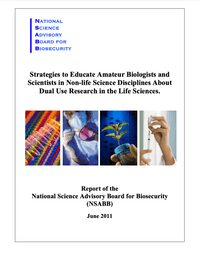Strategies to Educate Amateur Biologists and Scientists in Non-life Science Disciplines About Dual Use Research in the Life Sciences
[Dual Use Research for Amateurs]
This guide contains strategies and tools for promoting awareness of the dual use research issue within the life sciences community. At the request of the U.S. government, this guide is aimed at two non-traditional audiences: scientists trained in non-life sciences fields who nonetheless contribute to life science research and amateur biologists who pursue life science research as an avocation.
SUMMARY
This report describes strategies for educating people engaged in biological research without formal life sciences training on potential areas of dual use concern. The report was published by the National Science Advisory Board for Biosecurity (NSABB), a federal committee that advises the United States government on issues related to biosecurity and dual use research. The United States government charged the committee with developing strategies for promoting awareness of dual use issues amongst two non-traditional audiences, scientists who were not trained in the life sciences but nonetheless contribute to research in the field and amateur biologists. In the report, the committee makes a series of observations about these groups and then provides recommendations for outreach strategies based on those observations.
One of the interviewees mentioned the urgent need for dual use guidance for amateur biologists, noting that even a high schooler could create a potential dual use material with the amateur biology tools available today. We included this resource to fill that gap in guidance. This report may help teachers, trainers, and public officials develop strategies for raising awareness of dual use concerns amongst non-traditional audiences. While certain observations and strategies may be tailored to an American audience, the guide also includes observations about synthetic biology organizations with international reach, like DIYbio and International Genetically Engineered Machine (iGEM).


..png)
